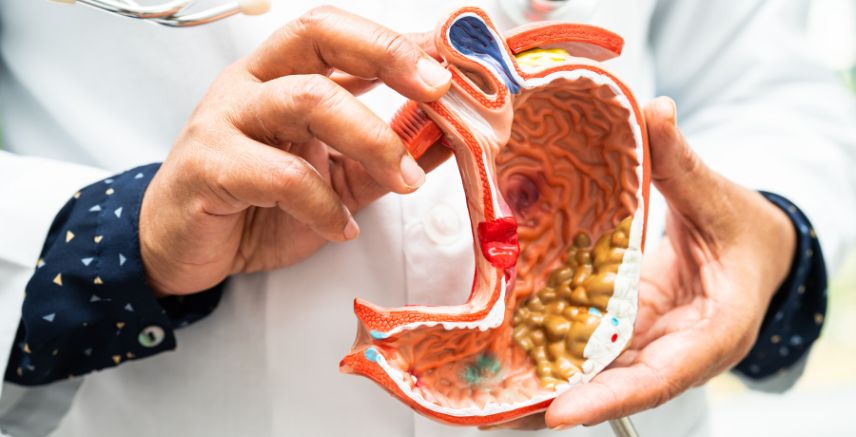Speak to Your Doctor About Stomach Cancer Treatment
Stomach cancer, or gastric cancer, is treated with a combination of therapies depending on the stage, location and severity of the disease. The following are the most common treatment options, including specific medications.
1. Endoscopic Mucosal Resection
If the cancer is diagnosed in its early stages, then an endoscopic mucosal resection may be suggested. This procedure uses an endoscope to remove cells from the mucosal lining of the digestive tract. It is minimally invasive.
2. Surgery
There are a variety of surgeries that may be performed in the treatment of stomach cancer and they depend once again on where the tumor is located and its stage. Sometimes surgery will be combined with other therapies such as chemotherapy or radiation therapy to shrink the tumor before surgery (preoperative therapy) or to decrease the likelihood of the cancer returning after surgery (adjuvant therapy).
The main surgery for stomach cancer is called a gastrectomy, which is when part of all of the stomach is removed. This surgery may also include the removal of part of all of the lymph nodes near the stomach, and other nearby organs or tissues such as small intestine, the spleen or esophagus.
Other types of surgery for stomach cancer include:
- Gastrojejunostomy.
- Endoluminal laser therapy.
- Endoluminal stent placement.
3. Chemotherapy
Chemotherapy can be used on its own or in conjunction with surgery depending on the stomach cancer stage. This treatment uses chemotherapy drugs to kill cancer cells or stop them from dividing in order to stop cancer growth. In stomach cancer, chemotherapy is often given systemically, which means it is taken orally or through an IV drip so that it spreads throughout the whole body via the bloodstream.
Common chemotherapy medications include:
- Fluorouracil (5-FU). A widely used drug for stomach cancer.
- Capecitabine (Xeloda). An oral chemotherapy alternative to 5-FU.
- Cisplatin. Often combined with other drugs for more aggressive treatment.
- Oxaliplatin (Eloxatin). Frequently used in advanced or metastatic stomach cancer.
- Irinotecan. Sometimes combined with other chemotherapy agents.
4. Radiation
As the name indicates, radiation therapy for stomach cancer involves the use of radiation or high energy x-rays to keep cancer cells from growing and/or to kill them. Stomach cancer is often specifically treated with external beam radiation therapy, which means a machine located outside of the body is aimed at the location of the cancer and targets it with radiation. Unlike chemotherapy treatment, which is often systemic in stomach cancer treatment, external beam radiation therapy is localized.
5. Immunotherapy
Another form of stomach cancer treatment involves the use of biological therapy, specifically immunotherapy. This type of treatment uses substances made from living organisms to help your own immune system target and fight off cancer. The human body naturally has immune system cells designed to detect and destroy abnormal cells before they can turn cancerous.
However, certain cancer cells can hide from these immune cells thanks to genetic changes, protective proteins on their surfaces that turn off immune cells or by changing normal cells around the tumor to impact how they interact with immune cells. Immunotherapy drugs are designed to work in more than one way to kill cancer cells and improve the function of your own immune system in doing so.
Two common immunotherapy medications are:
- Pembrolizumab (Keytruda). For advanced stomach cancer with specific biomarkers like PD-L1.
- Nivolumab (Opdivo). Another PD-1 inhibitor used for metastatic or recurrent stomach cancer.
6. Clinical Trials
Clinical trials are research studies designed to evaluate new treatments, medications or procedures for stomach cancer. They offer patients the opportunity to access cutting-edge therapies not yet widely available, while also contributing to medical advancements that may benefit future patients. Participating in a clinical trial can be particularly valuable for individuals with advanced or treatment-resistant stomach cancer.
Different types of clinical trials you might be able to join include the following:
- Treatment trials. Focus on testing new drugs, combinations of existing drugs, or innovative approaches like immunotherapy or targeted therapy.
- Prevention trials. Study methods to prevent stomach cancer, particularly in high-risk individuals.
- Diagnostic trials. Explore better ways to diagnose stomach cancer earlier and more accurately.
- Quality of life trials. Investigate interventions to improve the comfort and well-being of cancer patients.
There are many options when it comes to stomach cancer treatment. Treatment plans will look different for each patient, depending on the stage of their cancer, if it has spread and they own unique, individual needs. The options in this article are often used in combination to maximize effectiveness. Consulting with an oncologist ensures a personalized approach to managing stomach cancer.
The information on this website is for general educational purposes only and is not a substitute for professional medical advice. Always consult your doctor or qualified healthcare provider before making changes to your health, diet or treatment plan.

